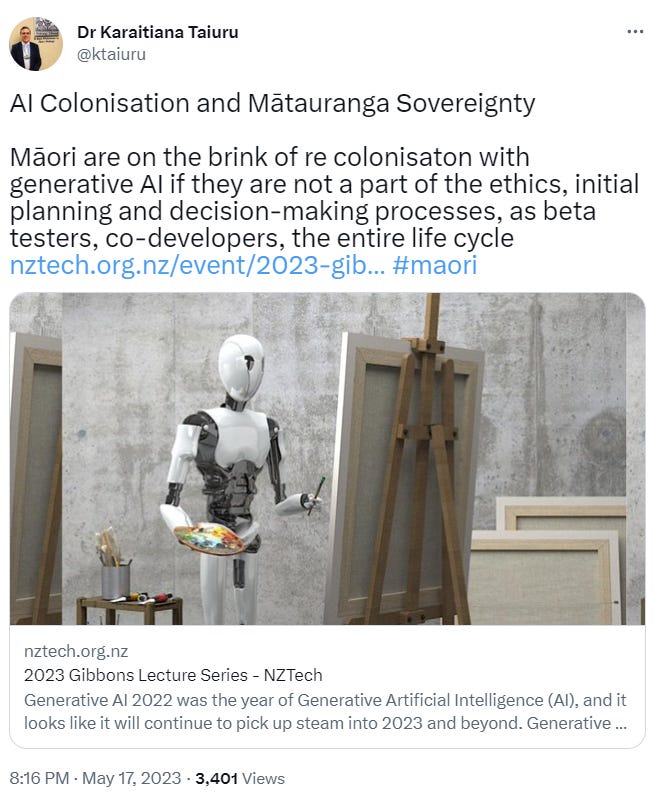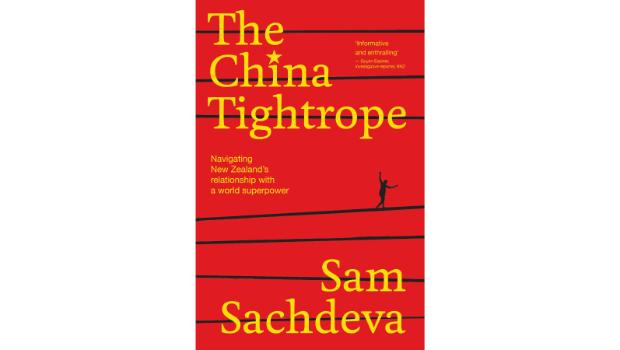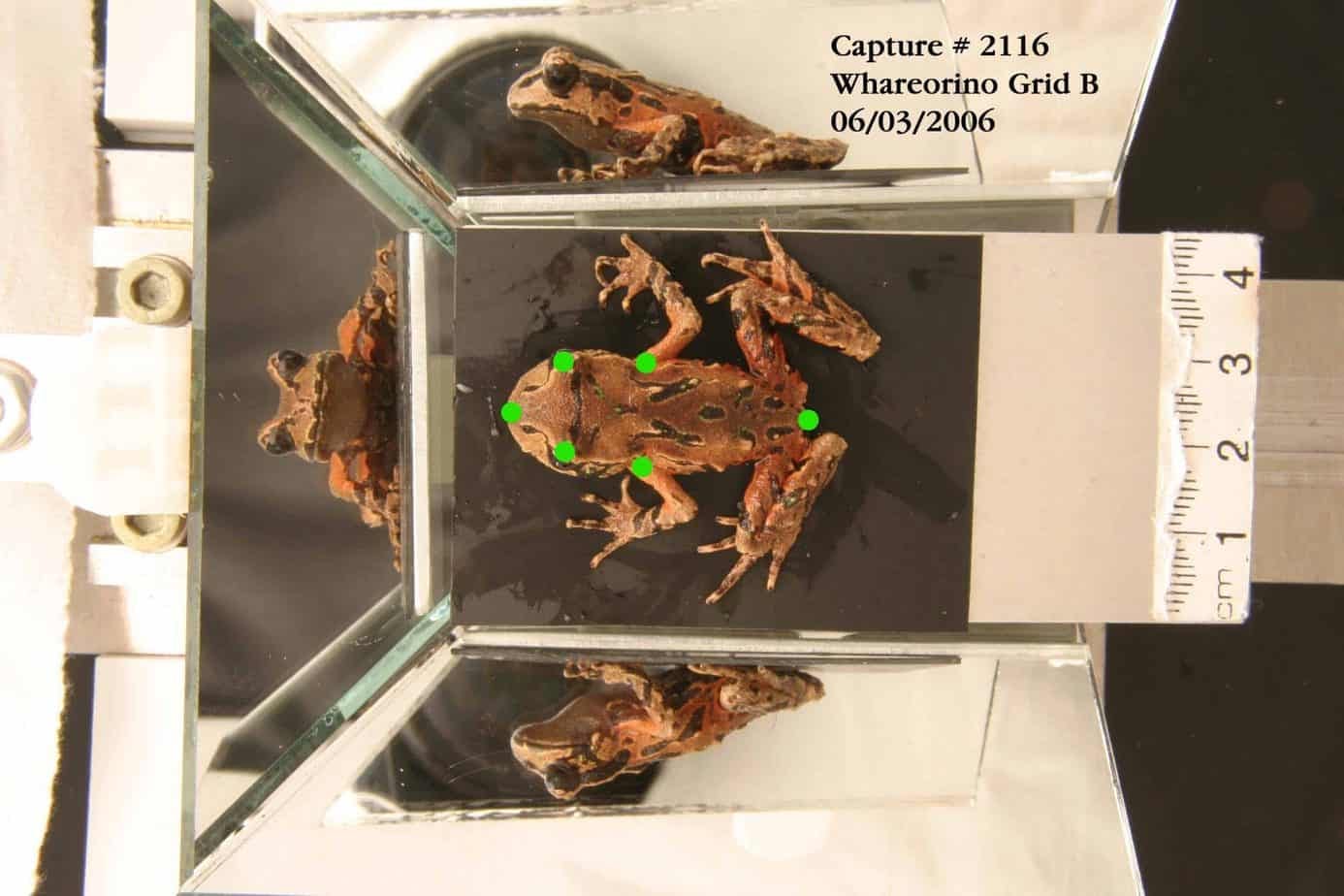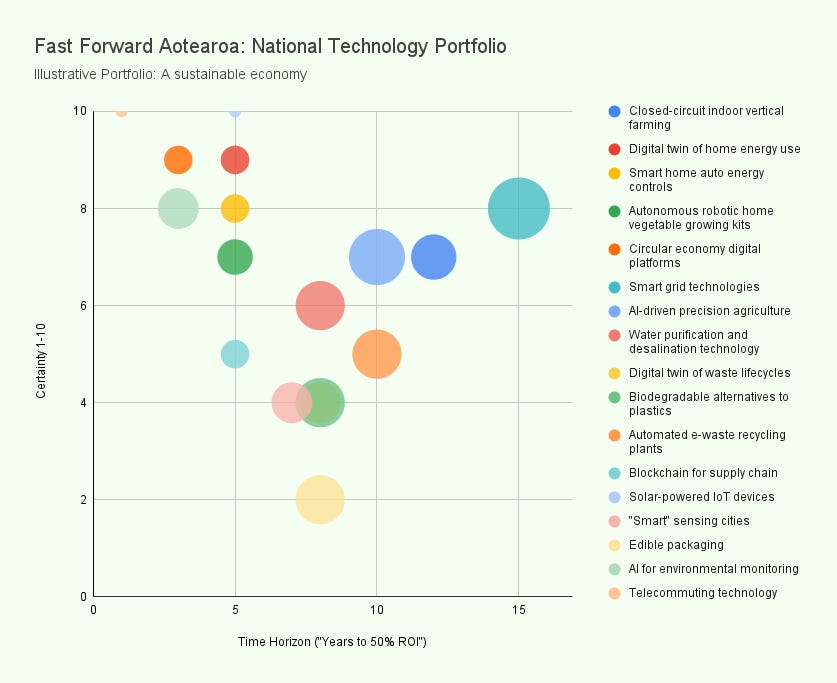⏩Fast Forward Aotearoa #40: generative AI meets Aotearoa politics🗳️te kāhui raraunga⚖️♾️magnets in space🧲🛰️the China tightrope🎪portfolio construction cont'd…🫧
NOT AI GENERATED
Kia ora,
Welcome to this week’s ⏩Fast Forward Aotearoa, my newsletter and book-in-progress thinking about emerging technology and the unfolding future of my corner of the world, Aotearoa New Zealand. Thanks for reading!
(TIP: If you want to keep receiving the weekly Wednesday Memia emerging tech newsletter but prefer not receive these Aotearoa-focused posts you can manage your subscription preferences here.)
Final reminder if you haven’t already to register for my fireside chat on generative AI with Boma’s Kaila Colbin tomorrow. Looking forward to it!
Aotearoa roundup
A quick roundup of threads I’ve been tracking recently… and then continuing on with the book. (Big book milestone this week: compiled all instalments so far into one big 70,000-word draft. Now to start editing it down… thanks John McD for the helpful advice…:)
🗳️Generative AI meets Aotearoa politics
One of the biggest stories this week was that the National Party had used a generative AI tool (Midjourney) to generate campaign ads: it’s not exactly subtle.

This follows the playbook from the US where the Republican party used AI to generate images of an apocalyptic post-Biden 2024 win future in an attack ad.
Domestic mainstream media has been quick to pick this story up and run with it:
Hilariously the advertising agency responsible actually used a free Midjourney account so some of their early work is available for all to see… an exquisite “oops” moment.

In the same article there’s an informative interview with Disinformation Project research fellow Sanjana Hattotuwa and psychologist / AI commentator Paul Duignan: Where to draw the line on AI political ads?
Paul Duignan also penned an opinion piece in Stuff: What National's AI advertising image ruckus actually points to:
“I suspect the National Party is currently trying to work out how to get out of this unintended own-goal, unbeknown to its leadership, and may backtrack on defending the use of AI images.
Otherwise, every time they put out advertising in this election campaign, the other parties will taunt them with claims that they are untrustworthy.
Regardless of how it plays out, this incident highlights how “trust”' is about to be a central issue in everything we do in an AI-saturated world.“
His prognosis is bleak, but I think pretty realistic:
“AI will force us to move digital literacy to an entirely new level. I suspect the message will have to change from “be sceptical about what people say and show you” to a simple ‘don't bother listening to people you can't trust’.“
Dylan Reeve had a go at a National Party AI-generated ad himself. Spicy.
I’ve been thinking and doing some interviews on this topic over the last week, my evolving thoughts:
Generative AI technology has arrived and is definitely not going away. Deepfake text-to-image is production-ready, likely voice and video will be in time for this year’s election. We need to learn to live with it, quickly.
Using AI-generated content tools clearly provides a productivity and creativity boost if you know how to use them well. If you’re not using them, your content is soon going to look thin and humdrum by comparison. (Yes, a political party may get a short-term “bump” by ruling it out - but “Luddite authenticity” will only appeal to a small corner of the electorate for a short moment…)
All advertising (in particular political advertising) is designed to manipulate people... AI just takes it to another level of sophistication.
Dunning-Kruger applies in spades here: we all think we have the cognitive smarts to resist manipulation and determine what's real and what's not...but in reality we're entering a time now when even the “smartest” people will struggle to tell what's real and what's fake.
Here’s a prediction: soon nearly ALL content will be AI generated, at least to some degree. Photoshop to touch up / extend / manipulate photos…ChatGPT to edit down / summarise articles… it will be practically impossible to tell AI-generated content from human-generated.
Given that this is happening in an election year here in Aotearoa, my main concern is that international bad actors (states, non-states, criminals and just plain chaos actors…) will be testing out their technology in Aotearoa as a "beta test market" in advance of the US elections in 2024. As such, the disinformation flood could really be suddenly turned on at scale while the capability of law enforcement / intelligence agencies to track and police this may not have advanced fast enough from last year’s Parliament Protests. Encrypted social media apps like Telegram and Zello were used effectively as misinformation vectors then… expect these and other new apps may turn up before the election this year specifically for this purpose?
The biggest risk (and the prize which the misinformation tech players will be chasing in preparation for US 2024) is a disputed election result... a flood of (industrially produced, targeted) synthetic media drowns out the mainstream election results in the weeks around 14th October and Parliament Protests 2.0 kick off…
Suggested policy interventions:
I think above all there’s an urgent need for public education campaigns on what this new technology can do. One aim is to develop at least enough critical thinking so that people are able to question what they see online, even though it looks real.
Publicly-endorsed AI tools online to help people detect whether content has been AI-generated that would be helpful too…although that’s an ongoing Darwinian struggle
And, let’s not forget encouraging as many people as possible to “learn by doing” - actually using generative AI is probably the best way to educate the electorate ... so enabling free access to the main tools would be a big step up in capability.
Immunize against electoral manipulation: play the disputed election scenario out in detail beforehand: simulate what might happen and give people an opportunity to think about how they might react… and how they can find authoritative sources of truth. (Would make for an interesting national “wargame”!)
The Disinfomation Project warn about the impact of "fragmented realities", "industrial production" of "synthetic media" … I’m assuming Police and Intelligence Agencies are trawling all over the streams of data and have developed tools to intervene… let the public know what is and isn’t possible.
What can political parties do? Above all, agree to a binding code of conduct. Most simply: that all AI-generated content should be marked as such …. as we go forward and most content becomes AI-generated to some degree, at least agreeing to mark traditionally generated content as NOT AI GENERATED.
Longer term, let’s not lose sight of the fact that GenAI will likely have lots of positive impacts here as well: improving the accessibility / productivity of government agencies, bolstering regulation and law enforcement capacity, helping policing agencies to more rapidly detect misinformation and respond. At heart, enforcement and intelligence agencies will have no choice but to rapidly adopt AI tools in order to keep up with malicious use of AI… so as a society we may need to allow some leeway on the risks here to enable quicker public sector adoption (…while keeping a keen eye on ensuring transparent and right-sized governance controls in future).
AI colonisation?
An alternative angle on generative AI is one of “colonisation”. Māori data and emerging technology ethicist Karaitiana Taiuru is a prolific thought-provoker on the considerations of new technologies from a Te Ao Māori viewpoint. He recently gave a lecture on how generative AI is potentially another “re-colonisation” process:
The colonisation lens here can actually be cast far more widely… I’d go as far as to say that one way of viewing the current generative AI explosion is the “colonisation” of the entire non-Chinese world by a very small number of multi-billion dollar US tech firms and their shareholder interests. Perhaps we’re *ALL* being colonised now…
⚖️♾️Te Kāhui Raraunga
On the related topic of Māori data sovereignty, respect to the team from Te Kāhui Raraunga who have just published a detailed, well-researched report proposing a Māori Data Governance Model:
“This report describes the Māori Data Governance Model that has been designed by Māori data experts for use across the Aotearoa New Zealand public service. Māori data is a taonga that requires culturally grounded models of protection and care. The Model provides guidance for the system-wide governance of Māori data, consistent with the Government’s responsibilities under te Tiriti o Waitangi.”
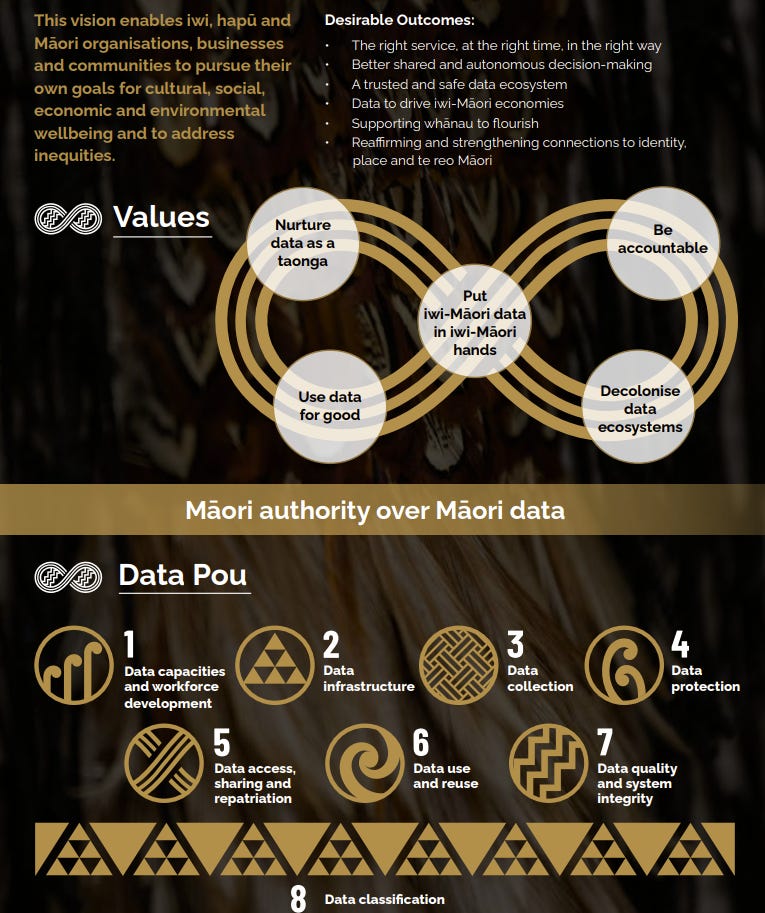
There are plenty of statements in the report which fundamentally challenge the status quo. Just one example:
“Applied to Māori data, the scope of data protection needs to be broader than prevailing regulatory frameworks that focus solely on personal data protection. The concept of having shared responsibilities for the protection and use of information and knowledge is an enduring one in te ao Māori. Any application of data privacy and protection of Māori data must thus address collective dimensions of privacy and be informed by values and concepts that are grounded in Māori knowledge systems and practice”
Clearly a lot of thought and consultation has gone into the report and the proposed actions. There are some pretty major redesigns of government data systems implied which may run into questions of idealism vs affordability… As with all such efforts at data governance, these frameworks start high on principles but are rapidly reduced to more mundane practical tasks such as data cataloguing, cleansing, requirements analysis, procurement and (budget-constrained) implementation of IT systems. A long road ahead…
For a provocative counterpoint to the whole “data sovereignty” framing which pervades data governance today, UK tech industry analyst Benedict Evans in the FT wrote last year: There’s no such thing as data:
“We’ve been here before: today’s discussions around AI and around data look a lot like discussions around databases in the 1980s. We transform what we can do with information and what questions we can ask, and how organisations can function. When databases were new, we worried, and some of those worries were real, but no-one today asks if America has more SQL, or if it matters that SAP is German. No-one at Davos talks about ‘SQL colonialism’. These technologies are not national strategic assets - anyone can have them, but what for? Databases enabled just-in-time supply chains, and Walmart, and let Apple make iPhones in China - those are the strategic questions. The same for AI, and ‘data’ - it’s not the new oil, just more software, so what do you build with it?“
A few other stories of note:
Crumbs from the table. This month’s Budget announcement was thin on the ground for tech investment: a 20% rebate for gaming studios (effectively just countering a similar Australian scheme) and just under NZ$30M for a “Horticulture Technology Catalyst initiative” which sounds like not much more than business coaching for growers. Not a single mention of software, robotics, AI, biotech, 3D printing, manufacturing automation, quantum computing…
Govt announcement Tech investment lays foundations for future economy (yeah, right.)
Compare Australia: AU$1Bn Critical Technologies Investment Fund to invest in:
Advanced manufacturing and materials technologies
Artificial intelligence (AI) technologies
Advanced information and communication technologies
Quantum technologies
Autonomous systems, robotics, positioning, timing and sensing
Biotechnologies
Clean energy generation and storage technologies.
DOH: DOC’s new flagship Great Walks booking website is still very publicly unlaunched after crashing under load a month ago…US vendor Tyler Technologies is in the sights. Frankly it points to fundamental digital design, procurement and project oversight weaknesses earlier in the piece which just *shouldn’t* happen in 2023 — what web application crashes under load these days if it’s properly tested?!?) More importantly: the whole race-condition design of the ticket allocation is broken — better to have a ticket lottery to balance supply and demand…? why doesn’t DOC just publish the requirements spec and see if any smart Aotearoa developers would come up with an open source version instead? Show Tyler the door…
Reading list
🎪The China Tightrope
Political journalist Sam Sachdeva has written a new book, The China Tightrope: Navigating New Zealand’s relationship with a world superpower, examining Aotearoa’s increasingly complex connections with China. In a published extract in Stuff he analyses New Zealand’s vulnerabilities to political interference.
TIN100 2023
This year’s TIN100 report was released, with analysis of Aotearoa tech investment in 2022:
“A total of $726m was invested in New Zealand tech companies across 154 early and later-stage deals in 2022, up 8.2% on the previous year despite a global funding crunch, according to the Technology Investment Report released today.”
Rollcall
As always, lots of movers and shakers around the motu…!
🧲🛰️Magnets in space
Tāmaki Makaurau space-flight systems company Zenno Astronautics is making [magnetic] waves with its world-first Z01 “superconducting magnetorquer for spacecraft attitude control” - basically a device which enables satellites to position themselves by interacting with the Earth’s magnetic field, fuel-free. This month Zenno announced that it had already surpassed $75 million in pre sales before the first launch... now that’s a tech company.
Auraflex-ing muscles
Dennisson Technologies develops artificial muscles from a special material it calls “AuraFlex”: a super-lightweight, ultraslim, cost-effective actuator that produces motion similar to muscles. In this podcast, founder Anvil Bañez discusses with Simon Pound how this could be the future of mobility aids and exoskeletons.
AI frog conservation
Lior Uzan has built an open source app, Pepeketua ID, which streamlines the identification of endangered Archey’s frogs using machine vision:
“This monitoring program allows DOC to track the frog population- knowing when the population grows (new frogs) or dwindles (missing frogs) from year to year.“
❄️Frost-resistant crops
Nick Wilson, Matt Boyd and Ben Payne from the Aotearoa Catastrophic Resilience project continue to knock out their research at a relentless pace: their latest is a paper in Nature Scientific Reports: Mathematical optimization of frost resistant crop production to ensure food supply during a nuclear winter catastrophe.
(Accessible overview: Food for thought: Frost resistant crops to hedge against the impacts of nuclear winter).
💎Kōhatu huna
🎸Completely off-topic…I am a very late arrival to The Beths fan club after their recent appearance on NPR’s Tiny Desk. But wow, what a world-class band from Aotearoa! Such intelligent lyrics, crafted melodies and tight-as musicianship by four eminently likeable, modest kiwis...
They are now embarked on a 6-months long tour of the Europe and US…this recent set at KEXP in Seattle showcases their sound and vibe (and a giant fish, from their album cover…):
🫧Portfolio construction continued…
Continuing to enumerate my “starter for 100” national technology investment strategy. Two more illustrative mission-oriented technology investment portfolios below.
Mission: A Sustainable Economy
A set of targeted technology investments to improve the overall sustainability of Aotearoa’s economy, including agricultural production, energy consumption, waste, environmental monitoring, water consumption.
(Actually 17 ideas in here…)
Closed-circuit indoor vertical farming
Keep reading with a 7-day free trial
Subscribe to Memia to keep reading this post and get 7 days of free access to the full post archives.






